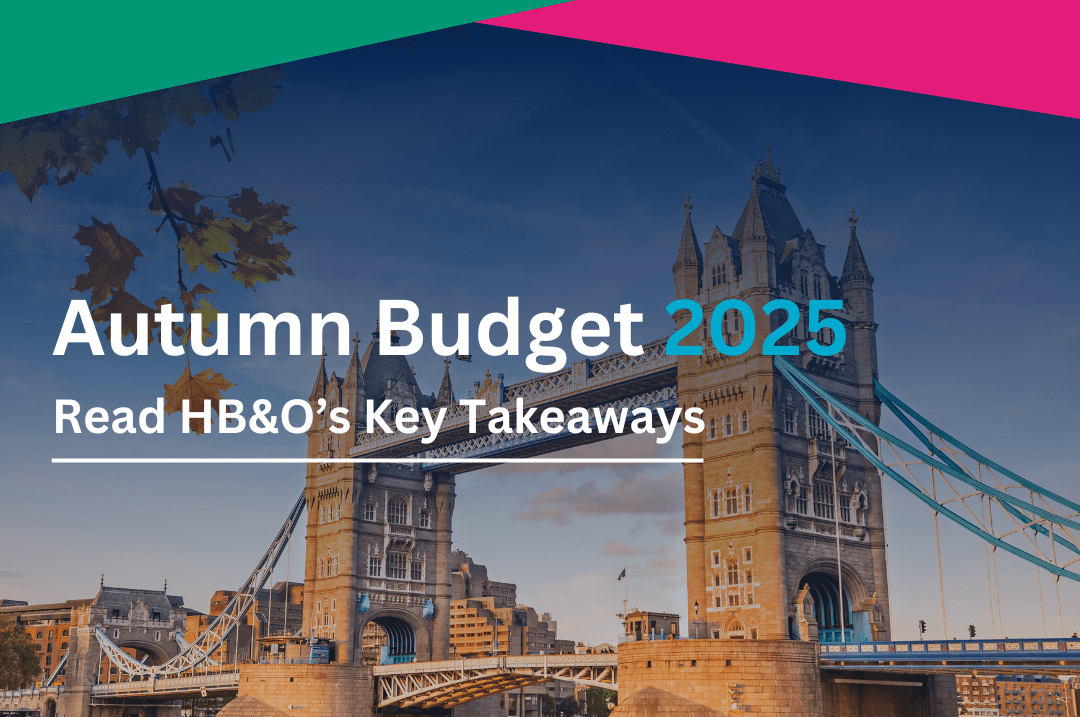Overview
- Many possible changes were the subject of speculation leading up to the Budget: this list includes things that have been ruled out, as well as changes that the Chancellor announced
- These key points include measures that were announced previously but are about to come into force
- Measures which will not take effect until future dates are listed separately below
Implemented immediately
- 100% CGT relief for disposals of shares to Employee Ownership Trusts is restricted to 50% from 26 November 2025
From January 2026
- New 40% First Year Allowance for most ‘main rate expenditure’ which does not already qualify for ‘full expensing’ or the £1 million Annual Investment Allowance (e.g. assets for leasing and assets above £1 million bought by unincorporated businesses)
- A new Advance Clearance Service to provide certainty for some R&D claims is to be introduced ‘in Spring 2026’ following consultation
From April 2026
Personal Tax
- Income tax thresholds and bands frozen (and continue to be frozen until April 2031)
- Income tax rates on dividend income rise from 8.75% to 10.75% (basic rate) and from 33.75% to 35.75% (higher rate); additional rate remains 39.35%
- Confirmation of the introduction of Making Tax Digital for Income Tax Self-Assessment from April 2026, with easements for the first year in relation to filing penalties
- The basis for company car benefit charges increases by one percentage point for 2026/27
- Benefit charges for company vans and private fuel in company vehicles increased
- ‘Carried interest’ moved to the income tax regime, with a discount for certain qualifying disposals
- CGT rate on disposals qualifying for Business Asset Disposal Relief increased from 14% to 18%
- CGT relief on incorporation to be claimed from 6 April 2026, rather than applying automatically
Business Tax
- Corporation tax payable on loans to close company participators which are not repaid to the company within 9 months of its year end to increase to 35.75%.
- There will also be a 40% first year allowance for main rate assets
- Increases in National Living Wage and State pension in line with the September 2025 inflation figure (3.8%)
- Corporation Tax late filing penalties doubled from 1 April 2026
- Extension until March 2027 of the 100% first year allowance for qualifying expenditure on zero-emission cars and charging points for electric vehicles
Employment Tax
- NIC Lower Earnings Limit and Small Profits Threshold increased by 3.8%
- Employers’ Class 1 NIC threshold frozen at £5,000, and NIC Upper Earnings Limit remains £50,270 (also frozen until 2031)
Inheritance Tax
- IHT Agricultural Property Relief and Business Property Relief at 100% will only apply to the first £1 million of combined value; above that limit, the maximum relief will be 50%; the £1 million will be transferable between spouses and civil partners
- IHT Business Property Relief restricted to 50% for all ‘unlisted’ shares which are quoted on recognised stock exchanges such as the Alternative Investment Market
- Existing treatment of UK residential property held indirectly by individuals who are not long-term UK residents, to be extended to UK agricultural land and buildings
- Nil Rate Band and Residence Nil Rate Band remain frozen until April 2031
VAT & Indirect Tax
- VAT rules changed to prevent private hire vehicle operators using the ‘Tour Operators Margin Scheme’ to pay VAT only on their profit margin
- Fuel duty remains frozen, and the temporary 5p cut announced in March 2024 will be extended to 31 August 2026
- Increases in online gambling taxes from April 2026
Other
- From July 2026, the Motability scheme will be reformed to reduce the relief available on high-end cars
- The ‘two-child benefit cap’ for Universal Credit is removed, increasing the available benefits for claimants with more than two children
From April 2027
- Income tax rates on property and savings income rise from 20% to 22% (basic rate), from 40% to 42% (higher rate), and from 45% to 47% (additional rate)
- For under-65s, no more than £12,000 of the annual £20,000 ISA investment limit can be invested in a cash ISA; the other £8,000 will have to be in stocks and shares
No change, or later
- High Value Council Tax Surcharge to be introduced on properties worth more than £2 million (in 2026) to apply from April 2028: £2,500 for properties over £2 million rising to £7,500 for properties over £5 million
- New mileage based e-Vehicle Excise Duty payable on use of electric and hybrid cars from April 2028
- From April 2029, salary sacrifice schemes putting more than £2,000 into an employee’s pension will be charged to NIC as if cash salary was paid
- All VAT invoices to be electronic from April 2029
- All low value import consignments to be subject to customs duties from April 2029
- Company car tax rates were announced last year for 2028-29 and 2029-30, to provide long-term certainty; the incentives for purchasing electric vehicles will be maintained
- Plan 2 Student Loan repayment thresholds frozen until April 2030
If you have any questions about the Autumn Budget, please don’t hesitate to get in touch.
Email: [email protected]














